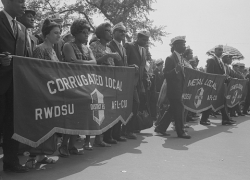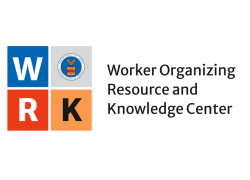
For many people, the only thing that comes to mind when they think about the Labor-Management Reporting and Disclosure Act and the Office of Labor-Management Standards is union reporting requirements. But management is an equally important part of our reporting and disclosure program. There’s a reason management is part of the agency’s and the act’s name.
When Congress enacted the National Labor Relations Act in 1935 it clearly stated:
“[I]t is declared to be the policy of the United States to ... encourag[e] the practice and procedure of collective bargaining ... by protecting the exercise by workers of full freedom of association, self-organization, and designation of representatives of their own choosing, for the purpose of negotiating the terms and conditions of their employment or other mutual aid or protection.”
Congress enacted the Railway Labor Act and Labor Management Relations Act with similar principles in mind, and, when Congress enacted the LMRDA in 1959, it found that:
“[I]n the public interest, it continues to be the responsibility of the Federal Government to protect employees' rights to organize, choose their own representatives, bargain collectively, and otherwise engage in concerted activities for their mutual aid or protection ... [and that] the enactment of this Act is necessary to eliminate or prevent improper practices on the part of labor organizations, employers, labor relations consultants, and their officers and representatives which distort and defeat the policies of the Labor Management Relations Act, 1947, as amended, and the Railway Labor Act, as amended.”
I emphasized employers and labor relations consultants to reinforce that the LMRDA isn’t just about unions. The act covers employers who make certain payments or enter into certain agreements. This includes employers making payments to spy on their employees and unions in order to learn about their organizing activities. It also includes employers engaging consultants to spy on their employees or persuade them to exercise their protected right to organize and bargain collectively.
Spying on employees and unions or trying to persuade employees about whether to support a union does not violate the LMRDA (although it may violate other laws). But Congress decided that employees ought to know when that is happening so they can take that into account when deciding whether or not to support a union. So the act requires employers to file reports with the Department of Labor “showing in detail the date and amount of each such payment, loan, promise, agreement, or arrangement” as well as “a full explanation of the circumstances of all such payments, including the terms of any agreement or understanding pursuant to which they were made.” The act also requires that employers file reports detailing expenditures made “where an object thereof, directly or indirectly, is to interfere with, restrain, or coerce employees in the exercise of the right to organize and bargain collectively through representatives of their own choosing” – in simple terms, when an employer has violated the NLRA.
OLMS is responsible for creating the reporting forms, collecting them and making them public, and for enforcing the requirement that they be filed. The required forms are the Forms LM-10, LM-20 and LM-21. You can find the filed reports on the OLMS website.
Even though these reports are legally required, we have evidence that suggests many employers and their consultants are not filing them. The National Labor Relations Board reports that there were at least 1,125 organizing campaigns in 2021 and research suggests that employers hire persuader consultants in around 75% of those. However, in 2021, we received only 166 persuader-related Form LM-10 reports, 314 Form LM-20 reports and 56 Form LM-21 reports. By comparing the LM-10 and LM-20 forms, we’ve also discovered significant under-reporting in both directions. We are also confident that there is under-reporting of expenditures made with an object of violating the NLRA because, despite there being literally thousands of cases in which the NLRB found an employer to have violated the NLRA, our electronic records don’t contain a single report from a single employer disclosing such an expenditure. Electronic records go back only so far, but no one here can remember a paper report disclosing such an expenditure. If it ever happened, it’s lost in the mists of time.
OLMS is taking steps to end this chronic non-compliance. Earlier this year, we reestablished our Persuader Reporting Orientation Program, a compliance assistance program designed to remind employers and consultants involved in union organizing campaigns of their reporting obligations. Since reestablishing this program, we have sent orientation materials to more than 1,900 employer recipients.
We’re also instituting a tip line and encouraging unions, employees, and others who become aware of persuader activity to contact us. We will take appropriate investigative and enforcement actions as necessary. You can find a link to the tip line here. We will also work with the NLRB to identify employers who must file Form LM-10 reports identifying expenditures they made with an object to interfere with, restrain or coerce employees in the exercise of their protected organizing and bargaining rights.
Enforcement of the LMRDA is our No. 1 priority at OLMS. But enforcement means enforcement of both the L and the M in LMRDA. Congress did not tell the Department of Labor to enforce the LMRDA’s union reporting requirements but ignore the employer and consultant reporting requirements, and we will do what it takes to treat those reporting requirements evenhandedly. Learn more at dol.gov/agencies/olms.
Jeff Freund is the director of the U.S. Department of Labor’s Office of Labor-Management Standards.

 U.S. Department of Labor Blog
U.S. Department of Labor Blog






